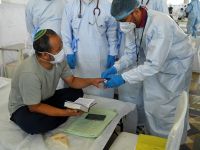The Bush administration is trying to organize a Middle East peace conference next month in Turkey, with foreign ministers from Europe and the region participating, a U.S. official has told AP.
The agenda and other preparations remain to be made, said the official. U.S. President George W. Bush's scheduled meetings this weekend with Egyptian President Hosni Mubarak and next Monday with Israel’s Prime Minister Ariel Sharon could accelerate the planning.
U.S. Secretary of State Colin Powell said Tuesday he believes that the Palestinian people expect Arafat to do more for them. In an interview with National Public Radio, Powell said, "They have now been in the intifada for a year and half, and it hasn't brought them anything but grief." Now that Arafat has been freed from his Israeli-imposed detention, Powell said, "There is a burden on him to perform. Leaders perform. It's time for Mr. Arafat to reform."
Bush is waiting to hear Mubarak spell out his demand this weekend for quick Palestinian statehood, the White House said. Mubarak, visiting with Bush on Friday and Saturday, disclosed his demand for a statehood deadline on in an interview with The New York Times and through an adviser who met with a half-dozen reporters in Washington.
"I think it's probably wise for me to listen to what he has to say and not read it through the filter of a fine newspaper," Bush replied when quizzed about the Mubarak interview during a tour of the National Security Agency.
Mubarak told the daily in Cairo, Egypt, on Sunday that he would press Bush to support declaration of a Palestinian state early next year.
In Damascus on Tuesday, President Bashar al-Assad told US envoy William Burns that any peace efforts should be based on UN resolutions and also gave a lukewarm reception to a proposed peace conference. "Syria will support an effort based on UN Security Council resolutions relating to the Israeli-Arab conflict and on the principle of land-for-peace," Assad told Burns.
Assad poured cold water on missions to the region by Burns and CIA chief George Tenet. "It is peace that will guarantee security," said Assad, adding that efforts to "guarantee security will be vain and yield no result so long as Israeli occupation continues."
Later in Beirut, Burns called for calm on Lebanon's border with Israel and for support of Washington's "three-track" strategy for peace between Israel and the Palestinians.
"I emphasized the strong US concern ... about maintaining calm on the blue line," he told reporters after talks with Lebanese President Emile Lahoud.
"I also had an opportunity to express our appreciation for the cooperation of the Lebanese government against individual groups connected with the al-Qaeda network and expressed our continuing concern about Hezbollah activities," said Burns.
Burns said he "reviewed with President Lahoud, President (George W.) Bush's three-part strategy" to resolve the Israeli-Palestinian crisis.
Washington's three-track strategy calls for starting a political process toward a two-states solution, supporting Palestinian efforts to build strong institutions in preparation for statehood, and ensuring effective Palestinian performance on security, AFP reported.
"President Bush is convinced that we must move along these tracks in parallel and in another words, it is not possible to achieve lasting security without a restoration of political hope, nor is it possible to make political progress without security," he said.
"And we believe that the Beirut Arab summit initiative offers a promising new element to reinforce that existing foundation," he added. (Albawaba.com)
© 2002 Al Bawaba (www.albawaba.com)







